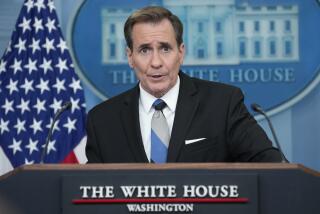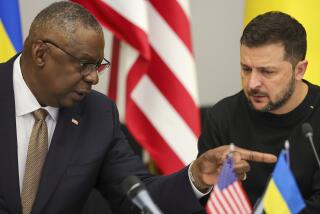Russian resistance torpedoes United Nations resolution on Syria
WASHINGTON – A final Western effort to win a United Nations blessing for military action against Syria appeared to collapse Wednesday, but the United States and its allies were still expected to launch a retaliatory attack in response to President Bashar Assad’s alleged use of chemical weapons.
Despite the apparent diplomatic failure, the White House received an endorsement from the 28-member North Atlantic Treaty Organization, the key Western military alliance.
After a meeting of the allaince’s policymaking arm, NATO Secretary-General, Anders Fogh Rasmussen said in a statement in Brussels that reports of a chemical weapons attacks by Syria “cannot go unanswered. Those responsible must be held accountable.”
PHOTOS: Portraits of Syrian rebels
The statement didn’t commit NATO to joining any military operation, but gave its blessing for such an effort, said George Benitez, an analyst with the Atlantic Council of the United States and editor of the Natosource blog. “They’re saying: ‘We support what you’re going to do.’”
He said there appeared to be fewer misgivings about military action than before other recent U.S.-led interventions. Germany and Poland, which kept a distance from the U.S., French and British attack on Libya in 2011, supported the NATO statement, for example.
At the U.N., in a meeting of the five permanent members of the Security Council, British representatives proposed a resolution condemning Syria’s use of banned chemical agents and called for all necessary means to respond to it.
But officials from Russia, Syria’s principal international backer, made it clear that they would oppose the resolution, killing the idea and foreclosing any further discussion, diplomats said.
Marie Harf, a State Department spokeswoman, said the Obama administration found the British proposal “strong and compelling.” She laid blame for the failure of the diplomatic effort on continued Russian opposition “to any meaningful [Security Council] action on Syria.”
Harf said U.S. officials would consult other countries about possible military action as well as other options, and “will take appropriate actions to respond in the days ahead.”
The White House has sought to build international support for punitive airstrikes against Assad’s government for the purported poison gas attack on the outskirts of Damascus on Aug. 21. More than 300 people were killed, and more than 3,000 were injured, according to the Syrian opposition and aid organizations.
Assad’s government denied responsibility for the attack, blaming rebels who have fought to oust him from power since early 2011. The United States and its allies have not yet offered proof to back up their contention that the Syrian government had carried out chemical attacks.
U.S. officials said the goal of any alliance attack on Syria would be to degrade Assad’s military and deter it from further use of chemical weapons. They said they are not trying to topple Assad or change the balance of power in the civil war.
Under international law, military action is justified in self-defense or with a U.N. blessing. But Harf said a strong response is warranted in this case because chemical weapons use violates international law and as well as international norms.
“They have violated the general laws of war,” she said.
ALSO:
Syria divided: Crossing a bridge where a sniper waits
Militants in Afghanistan launch attacks against NATO
Iranian parliament pursuing lawsuit against CIA for 1953 coup
Twitter: @paulrichter
More to Read
Sign up for Essential California
The most important California stories and recommendations in your inbox every morning.
You may occasionally receive promotional content from the Los Angeles Times.










